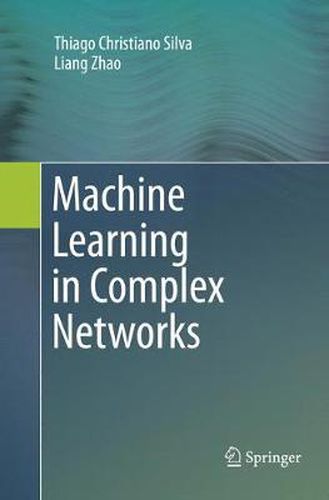Readings Newsletter
Become a Readings Member to make your shopping experience even easier.
Sign in or sign up for free!
You’re not far away from qualifying for FREE standard shipping within Australia
You’ve qualified for FREE standard shipping within Australia
The cart is loading…






This title is printed to order. This book may have been self-published. If so, we cannot guarantee the quality of the content. In the main most books will have gone through the editing process however some may not. We therefore suggest that you be aware of this before ordering this book. If in doubt check either the author or publisher’s details as we are unable to accept any returns unless they are faulty. Please contact us if you have any questions.
This book presents the features and advantages offered by complex networks in the machine learning domain. In the first part, an overview on complex networks and network-based machine learning is presented, offering necessary background material. In the second part, we describe in details some specific techniques based on complex networks for supervised, non-supervised, and semi-supervised learning. Particularly, a stochastic particle competition technique for both non-supervised and semi-supervised learning using a stochastic nonlinear dynamical system is described in details. Moreover, an analytical analysis is supplied, which enables one to predict the behavior of the proposed technique. In addition, data reliability issues are explored in semi-supervised learning. Such matter has practical importance and is not often found in the literature. With the goal of validating these techniques for solving real problems, simulations on broadly accepted databases are conducted. Still in this book, we present a hybrid supervised classification technique that combines both low and high orders of learning. The low level term can be implemented by any classification technique, while the high level term is realized by the extraction of features of the underlying network constructed from the input data. Thus, the former classifies the test instances by their physical features, while the latter measures the compliance of the test instances with the pattern formation of the data. We show that the high level technique can realize classification according to the semantic meaning of the data. This book intends to combine two widely studied research areas, machine learning and complex networks, which in turn will generate broad interests to scientific community, mainly to computer science and engineering areas.
$9.00 standard shipping within Australia
FREE standard shipping within Australia for orders over $100.00
Express & International shipping calculated at checkout
This title is printed to order. This book may have been self-published. If so, we cannot guarantee the quality of the content. In the main most books will have gone through the editing process however some may not. We therefore suggest that you be aware of this before ordering this book. If in doubt check either the author or publisher’s details as we are unable to accept any returns unless they are faulty. Please contact us if you have any questions.
This book presents the features and advantages offered by complex networks in the machine learning domain. In the first part, an overview on complex networks and network-based machine learning is presented, offering necessary background material. In the second part, we describe in details some specific techniques based on complex networks for supervised, non-supervised, and semi-supervised learning. Particularly, a stochastic particle competition technique for both non-supervised and semi-supervised learning using a stochastic nonlinear dynamical system is described in details. Moreover, an analytical analysis is supplied, which enables one to predict the behavior of the proposed technique. In addition, data reliability issues are explored in semi-supervised learning. Such matter has practical importance and is not often found in the literature. With the goal of validating these techniques for solving real problems, simulations on broadly accepted databases are conducted. Still in this book, we present a hybrid supervised classification technique that combines both low and high orders of learning. The low level term can be implemented by any classification technique, while the high level term is realized by the extraction of features of the underlying network constructed from the input data. Thus, the former classifies the test instances by their physical features, while the latter measures the compliance of the test instances with the pattern formation of the data. We show that the high level technique can realize classification according to the semantic meaning of the data. This book intends to combine two widely studied research areas, machine learning and complex networks, which in turn will generate broad interests to scientific community, mainly to computer science and engineering areas.